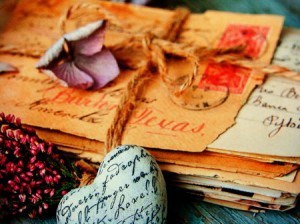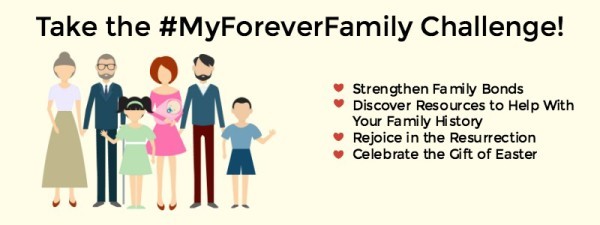In reading family history stories from both my husband’s side as well as mine I have noticed that many times the details of the women’s lives are missing. The men wrote their own autobiographies, mentioned things that may have happened to the women in their lives, but the women’s perspectives are glaringly missing. There are a few instances where we do have a great-grandmother’s account of what occurred or even a copy of a letter in her own writing. Those are oh-so-precious. And real!
I’ve often wondered why their stories are missing. I think part of it is they wrote letters. Those letters were sent to other people and while they might be floating around hidden in someone’s attic they are still gone. That’s not necessarily a bad thing. They kept track of their lives and shared it with others. It was just in a less permanent way than keeping a journal. Wouldn’t it be glorious to find a stack of letters written by your grandmother or great-mother?
 |
| (image credit) |
My own grandmother saved letters she received from everyone. Several years ago she gifted me with a binder containing all the letters I had written to her as a child. There were pictures I had drawn, funny stories I shared, and a lot of bragging about things I had accomplished. It has been a treasure to pull that binder out every now and then and remember what I was like as a child and the experiences I had.
Recently I came across an experience shared by Elder Henry B. Eyring. It happened when he was teaching a class at Ricks College back in the 1970s. He was trying to impress upon the class the importance of learning to write well.
“I was teaching from section 25 of the Doctrine and Covenants. In that section Emma Smith is told that she should give her time to “writing, and to learning much” (verse 8). About three rows back sat a blonde girl whose brow wrinkled as I urged the class to be diligent in developing writing skills. She raised her hand and said, “That doesn’t seem reasonable to me. All I’ll ever write are letters to my children.” That brought laughter all around the class. Just looking at her I could imagine a full quiver of children around her, and I could even see the letters she would write. Maybe writing powerfully wouldn’t matter to her.
“Then a young man stood up near the back. He had said little during the term; I’m not sure he had ever spoken before. He was older than the other students, and he was shy. He asked if he could speak. He told in a quiet voice of having been a soldier in Vietnam. One day, in what he thought would be a lull, he had left his rifle and walked across his fortified compound to mail call. Just as he got a letter in his hand, he heard a bugle blowing and shouts and mortar and rifle fire coming ahead of the swarming enemy. He fought his way back to his rifle, using his hands as weapons. With the men who survived, he drove the enemy out. Then he sat down among the living, and some of the dead, and he opened his letter. It was from his mother. She wrote that she’d had a spiritual experience that assured her that he would live to come home if he were righteous. In my class, the boy said quietly, “That letter was scripture to me. I kept it.” And he sat down.
“You may have a child someday, perhaps a son. Can you see his face? Can you see him somewhere, sometime, in mortal danger? Can you feel the fear in his heart? Does it touch you? Would you like to give freely? What sacrifice will it take to write the letter your heart will want to send? Start the practice this afternoon. Go back to your room and write and read and rewrite that paper again and again. It won’t seem like sacrifice if you picture that boy, feel his heart, and think of the letters he’ll need someday.” (Henry B. Eyring, Gifts of Love)
I have a few that my parents wrote to me as I was growing up. They are, indeed, scripture to me. They contain words of counsel, of encouragement, of praise, of love.
 |
| (image credit) |
I also write letters to my own children. Every year when the young women have Girls Camp in the summer the parents are asked to write a letter to each of their daughters who will attend. Hopefully those letters are treasured and kept.
Letter writing is becoming a lost art. It is unfortunate really. In writing we are able to express ourselves and say things we might be too embarrassed to say or give counsel that would otherwise be dismissed. We share a piece of ourselves. Sometime, if you haven’t done so already, take some paper and write a letter to your children. Express your love, your admiration for their accomplishments, your encouragement for the hard times they have yet to face. Those letters will be cherished pieces of paper.
And for the sake of your own family history, make a copy and keep it somewhere safe!
Do you have any letters written by your parents or grandparents? Have you written any to your children?

My grandmother still writes a few letters a year to me and I write to her. I often write out thank you notes for people and mail them. I’ve had the kids start writing little notes to their grandparents too. Every now and then I feel impressed to write out a whole letter to someone, my dad or mom or something. I hope they enjoy the letters!
I can’t even think of the last time I received anything handwritten from anyone besides my grandmother. It would be lovely! I always try to make what I write meaningful and specific. I share a memory, a story, a time when that person blessed my life. I always try to mention specific things because that’s what is meaningful to me in a letter or note. I really dislike when someone says, “You are so great!” So great at what? Why do you think that? Some days we all need a little extra encouragement and if someone would take the time to share in a note or letter some specific positives they see in us, well, it could really lift up our souls!
That was a nice story from Pres. Eyring.
My Grandma Ruth wrote out her testimony of the Gospel about 15 years ago.
I took my copy and glued it into the front of my Book of Mormon.
It’s such a treasure to have her testimony & in her own handwriting!
When my great grandmother died in 1996 family cleared out her things and found many writings of hers. She wrote a short history of herself, various stories of her childhood growing up in Chihuahua, Mexico, her courtship of my grandfather and his family welcoming her (she was his second wife), short stories, poems, many of them being written to friends and family and other things. My great-aunt compiled them and that is one of the greatest treasures I have of my sweet grandmother.
This is perfect. Jon and I were just talking about how we want to set up a “letter writting” station (just a desk with an old typwritter and some stationary) in our house to remind us to write letters. I inhertied two totes full of letters to my great grandmother– including all the love letters my great grandfather wrote her. I have been working on transcribing them (it is taking a long time) they are really a treasure but I do feel bad sometimes like I am reading things that they never thought their great granddaughter would be reading 🙂 But it is nice to get to know them better!
I love this post, Montse.
I love letters because of the handwriting that is preserved. I regret our digital age in this regard. But being one with nerve damage in her hands, I am also grateful for the digital…what a little conundrum.
I was just talking to my dad about getting his life story to paper and he said, “Mom said I get too detailed.” I quickly disagreed. “Dad, how many things do you wish you had asked your dad. How many details of his every day do you wish you knew?”
He reconsidered.